Crisp, savory Scotch eggs are quintessential British pub faire; delicious for brunching, snacking, and picnicking. Now you make perfect hard or soft-boiled Air Fryer Scotch Eggs at home!
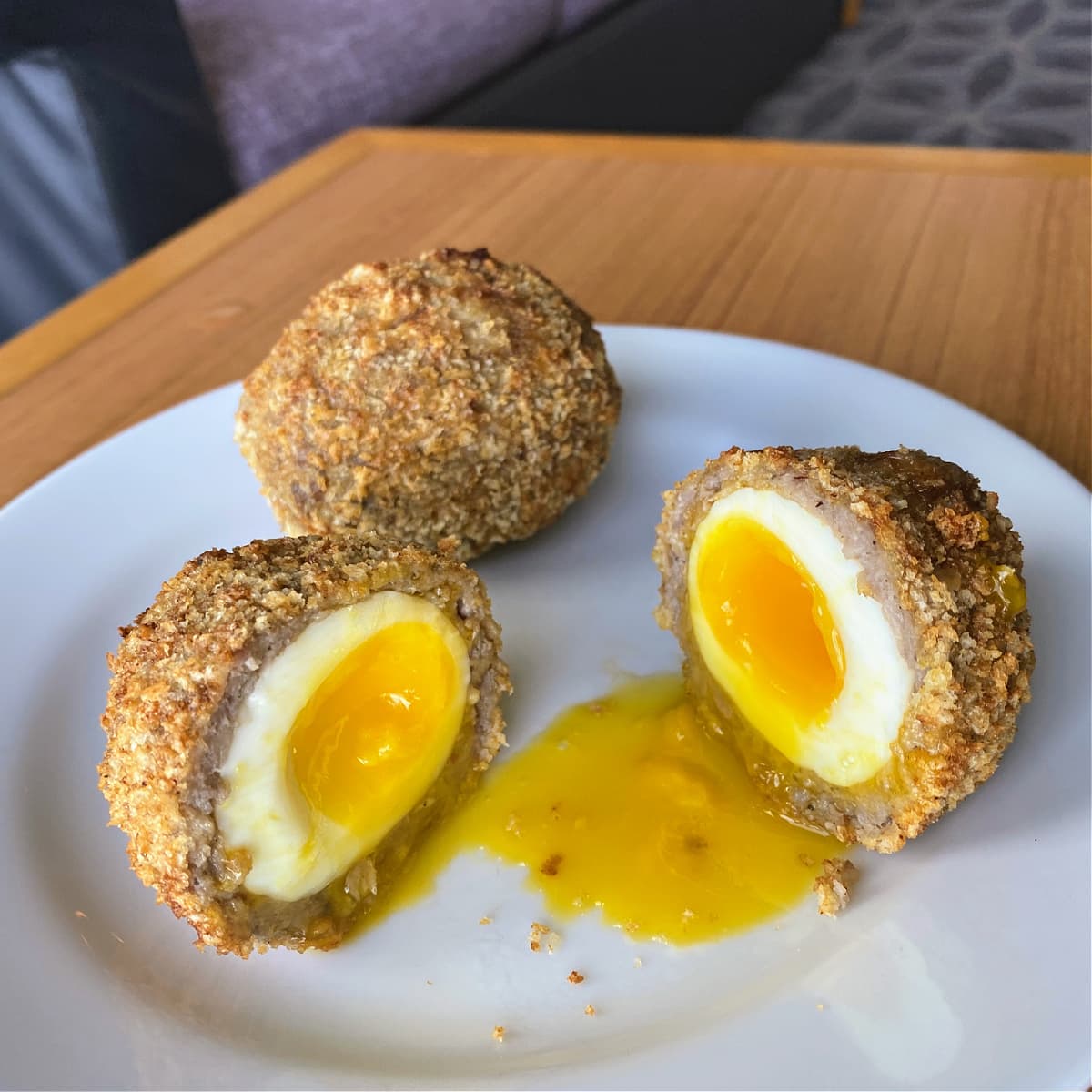
Jump to:
What is a Scotch Egg?
In its most basic form, a Scotch egg is a soft or hard-boiled egg wrapped in ground sausage and coated with bread crumbs, and then fried. Scotch eggs have a long history in London and beyond as a tidy, handheld snack item; perfect for pocketing and picnicking.
The origin of Scotch Eggs is as foggy as a cold morning on Loch Ness, but that’s about as close to Scotland as they come. While it is generally agreed that they originated in London, theories (dating back as early as mid-18th century) abound as to the actual genesis of these savory, protein-rich balls-o-breakfast.
Claims have been linked to everything from Indian koftas to Scots Guards stationed at London's Wellington Barracks. One particularly distressing account, from the Culinary Delights of Yorkshire, alleges they are a Yorkshire creation and were originally wrapped in fish paste rather than sausage meat. (Fish paste. That's a hard No for me.)
Today in the UK, you can buy Scotch eggs everywhere from pubs to grocery stores to gas stations. In the US, Scotch eggs are known more as a Sunday brunch item and Renaissance faire staple. They can be found on British-style pub menus as well, usually offered with dipping sauces on the side.
Until recently, for those who eschew deep-frying at home, Scotch eggs have been reserved for pub crawls and trans-Atlantic travel. However, with the dawn of air-frying, making them at home has never been easier!
Scotch Egg Ingredients
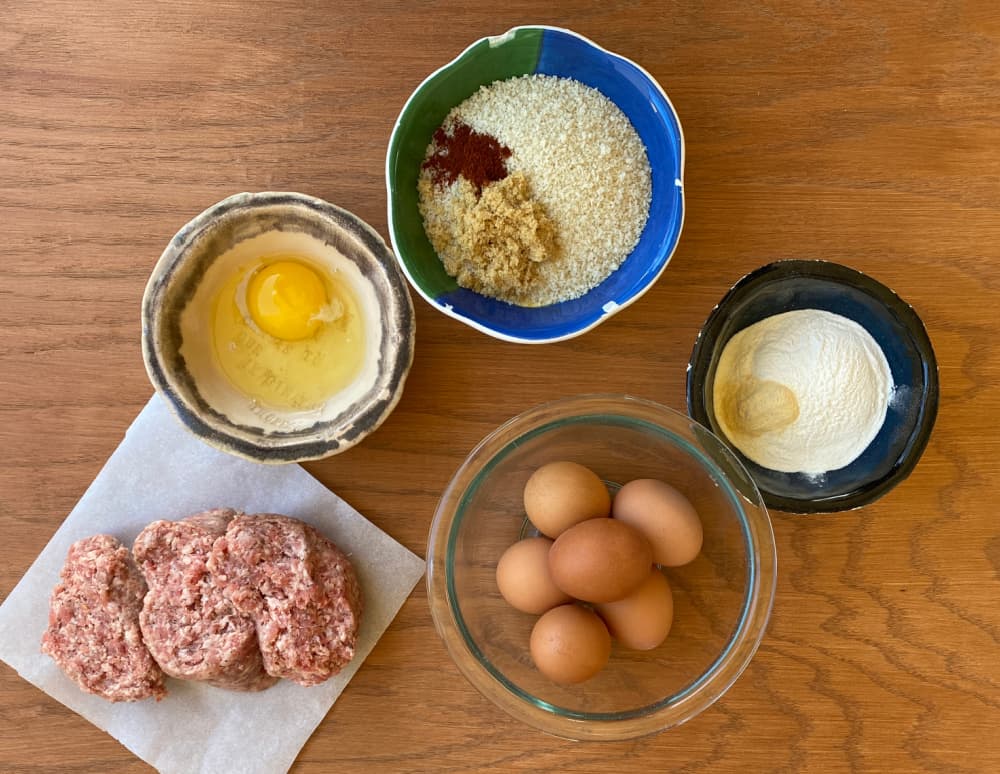
Air-frying time and temperature for this Scotch egg recipe are based on the use of the following specific ingredients:
- Eggs: This recipe is based on using USDA large eggs (EU size M). If you use different size eggs, the boiling and cooking times may need to be adjusted.
- Sausage: The cooking times are based on using one pound of Jimmy Dean regular pork sausage. If you use more or less, or use a sausage with a different fat content, cooking times and/or temperatures may vary.
- Wondra: We recommend using Wondra instead of all-purpose flour when making Scotch eggs. Wondra is finely ground flour that has been pre-cooked and dried. Ultra-light, it is lower in protein and gluten than all-purpose flour, which all translates into a light and crispy crust for fried and air-fried foods.
- Panko crumbs: The texture of Panko makes it especially suited for fried food because it absorbs less oil than regular breadcrumbs, keeping food more crisp and crunchy. Panko crumbs brown up evenly and consistently, even in an air-fryer!
- Brown sugar: We recommend using light brown sugar.
- Chili powder: We use a standard, mild ground chili powder. Use your favorite chili powder.
- Garlic powder
How to Make Scotch Eggs in an Air Fryer
Perfect Boiled Eggs
We prefer to boil the eggs in water; however, you can also do this first step in your air-fryer. (Scroll down for directions.)
Boiling Water Method
Personal preference dictates how long to boil your eggs. Mr B and I typically eat Scotch eggs for breakfast (or brunch) with a knife and fork, and prefer our eggs creamy and runny: a 6-minute egg is usually perfect for us. Simply increase your boiling time if you prefer a more solid center.
- Fill a medium saucepan halfway with water and bring to a boil over medium-high heat. (Do not remove your eggs from the refrigerator until your water has boiled.)
- Remove eggs from refrigerator and use a slotted spoon to carefully place them into boiling water. Do not crowd eggs in pan.
- Reduce heat, cover pan, and simmer for EXACTLY 6 minutes (or up to 9 minutes for firmer eggs). While eggs are cooking, prepare an ice bath for the eggs in a large bowl.
- After the allotted time, use the slotted spoon to remove the eggs from the boiling water and immediately submerge them in the prepared ice bath for 10 minutes to halt the cooking process.
Air-fryer Method
Preheat the air-fryer to 250°F (125°C). Place the eggs in an air-fryer basket and cook for 12 minutes, then immediately remove them and submerge them in a prepared ice bath for 10 minutes to halt the cooking process.
Note that air-fryers vary by model and manufacturer, so you may need to adjust the cooking time or temperature to achieve the desired cook on your eggs.
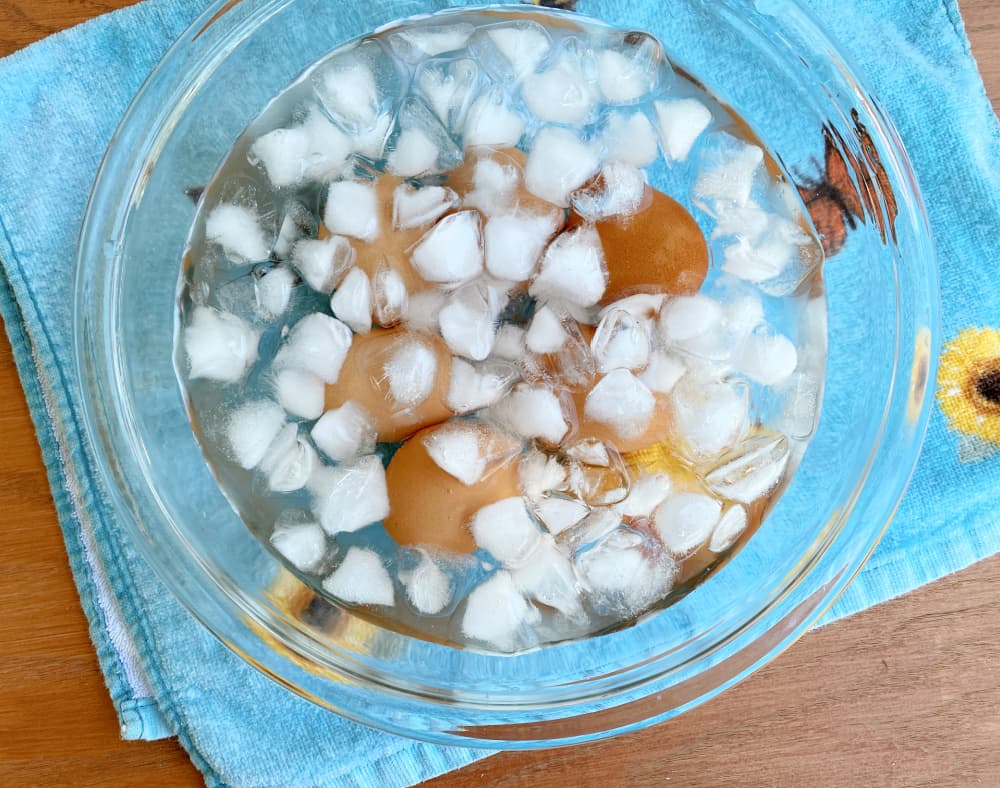
Now you're ready to cover the your eggs with sausage!
Cover Boiled Eggs with Sausage
Be sure to watch the demonstration in our Scotch Egg Video for a simple technique for doing this step!
Tip: If you are using soft-boiled eggs (i.e., 6-minute eggs), remember that they require a delicate hand. Unlike hard-boiled eggs, the yolk inside is too soft to offer any resistance against the white while being peeled, so they will break if you are too rough taking off the shell or applying the sausage casing.
Covering soft, a wobbly boiled egg with sausage can be challenging, but it's easier if you know a few simple tricks.
First, divide the sausage into 6 equal portions, each weighing 2⅓ ounces (65 grams).
I encourage you to use a kitchen scale for this step: the cooking times for this recipe are calculated based on using a specific type and amount of sausage. If you use too much or too little, or use a sausage with a different fat content, your cooking times may be different.
Roll each portion into a ball, and place in refrigerator.
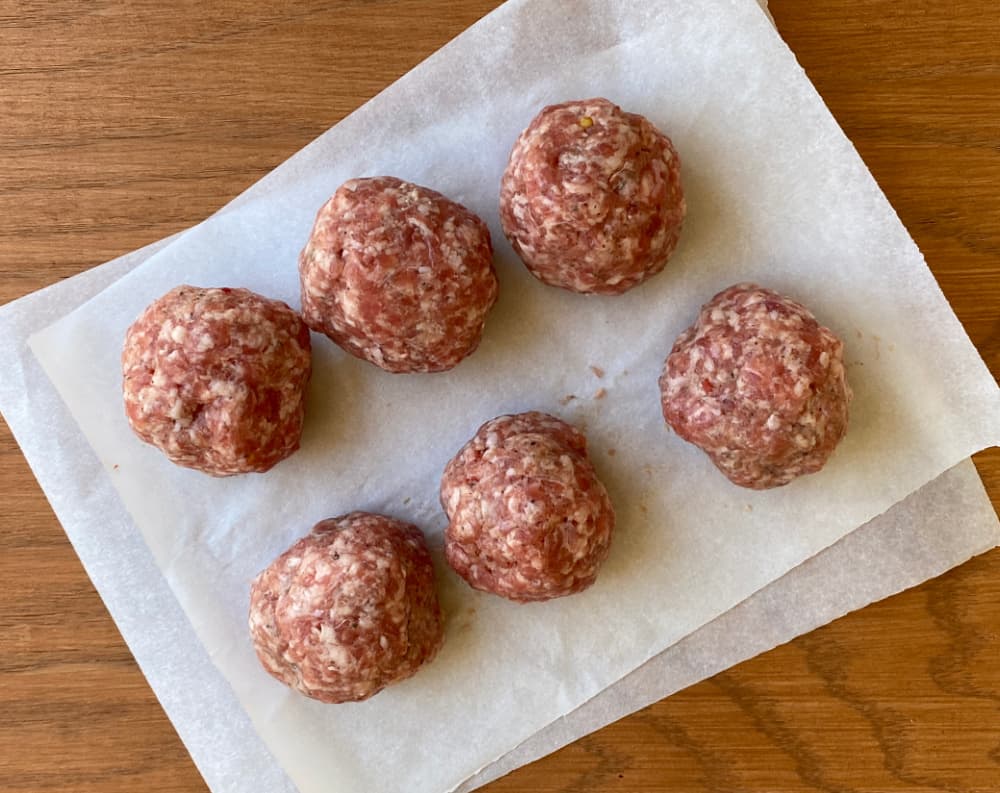
TIP: Slightly wetting your hands before forming the balls will keep the sausage from sticking as much. You want damp hands, but not so wet that they are dripping.
GENTLY peel the boiled eggs.
Once the eggs are peeled, rinse each one and use a paper towel to carefully pat it dry. (Sausage sticks much more easily to a dry egg than it does a slippery, wet one.) When eggs are dried, set aside.
The eggs I used here were fresher than I had hoped: older eggs are easier to peel. When I make deviled eggs, gnarly eggs are a real concern; however, I don't really worry about how the eggs look when making Scotch Eggs, because any rough spots will be covered up with sausage.
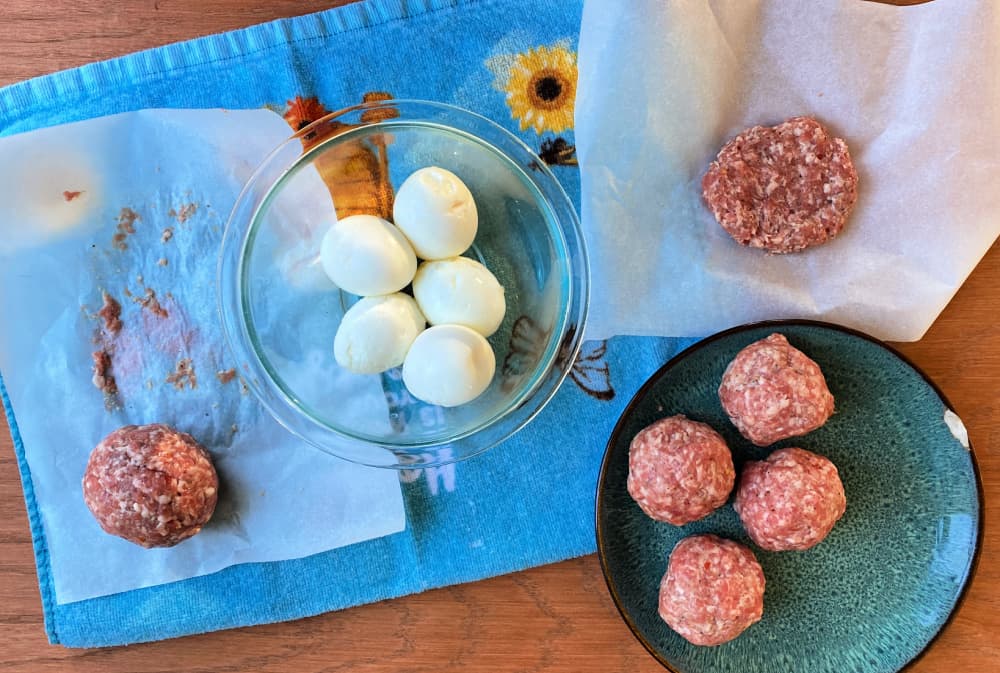
To cover an egg with sausage, start with one prepared egg and one cold sausage ball. (Watch the video!)
- Place meatball in the center of a parchment square. Gently pat the meatball down until you have an oval that is about a ¼-inch thick, and roughly 3 eggs long and 2 eggs wide.
- Place the parchment square in your palm. Gently lay a cold, dry, soft-boiled egg on top of the sausage oval, with the ends of the egg perpendicular to the long sides of the oval.
- Carefully pull the sausage away from the parchment as you wrap it around the egg. Continue until the sausage has completely released from the parchment and the egg is covered with sausage. I do this by folding the two sides into the middle, and them pressing the meat out to the sides. Don't be too concerned about the oval being perfect; it's just a starting point.
- Pinch off the thick sausage points that will form at each end as the oval is sealed. Check the egg carefully for areas where the sausage may be too thin or too thick. Even them out using the sausage you pinched from the ends.
- When the sausage appears to be distributed uniformly around the egg, gently pass the egg carefully from one hand to the other a couple of times, allowing the warmth of your palms to smooth the outside surface a bit and the gentle pressure to even out any bumps or rough spots on the surface.
- Repeat until all the eggs are covered with sausage.
Bread Sausage-covered Eggs
You will need three small bowls.
- Bowl 1: Wondra & garlic powder. (Stir to combine.)
- Bowl 2: Beaten egg.
- Bowl 3: Panko crumbs, brown sugar, and chili powder.
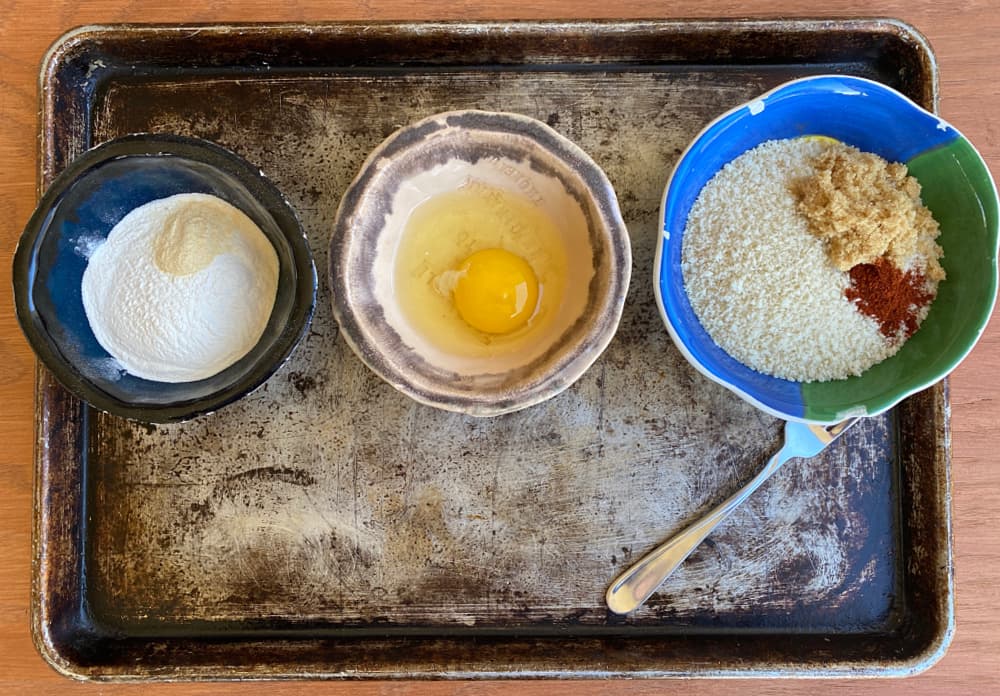
Roll each sausage-covered egg in flour mixture (Bowl 1) and shake off excess, then dip in the beaten egg (Bowl 2), and finally roll in the Panko crumbs (Bowl 3).
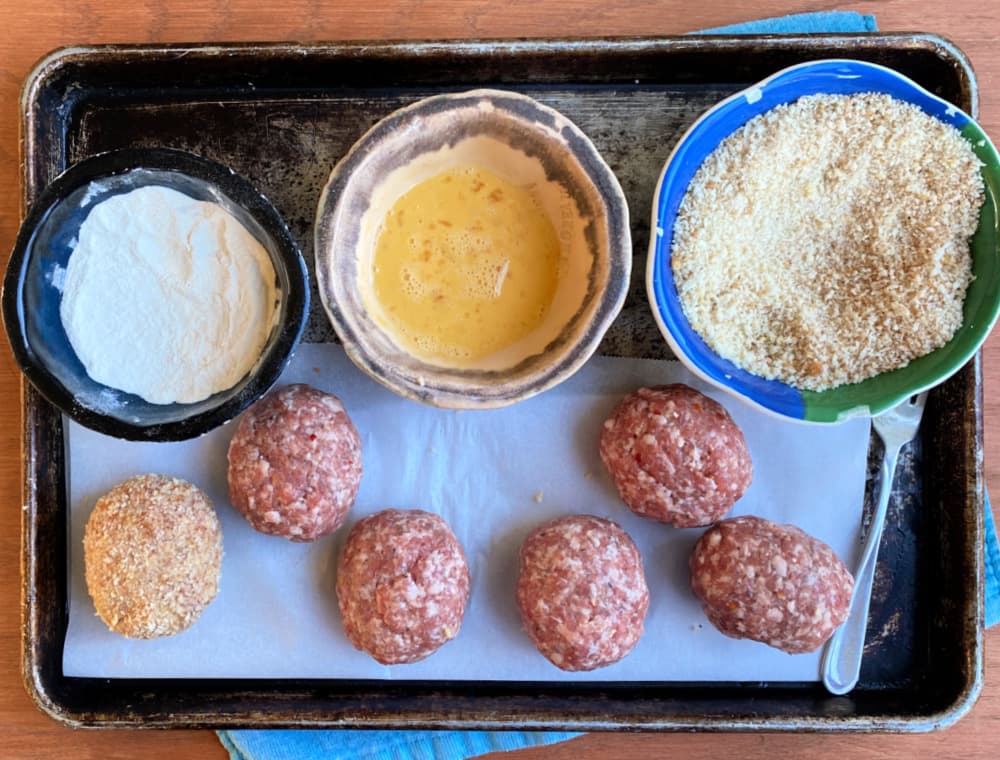
When I finish rolling the eggs in the last bowl, I like to pass it carefully from one hand to the other a couple of times, to help form and structure the outside crust a bit; much like you would form a meatball, but exerting far less external pressure.
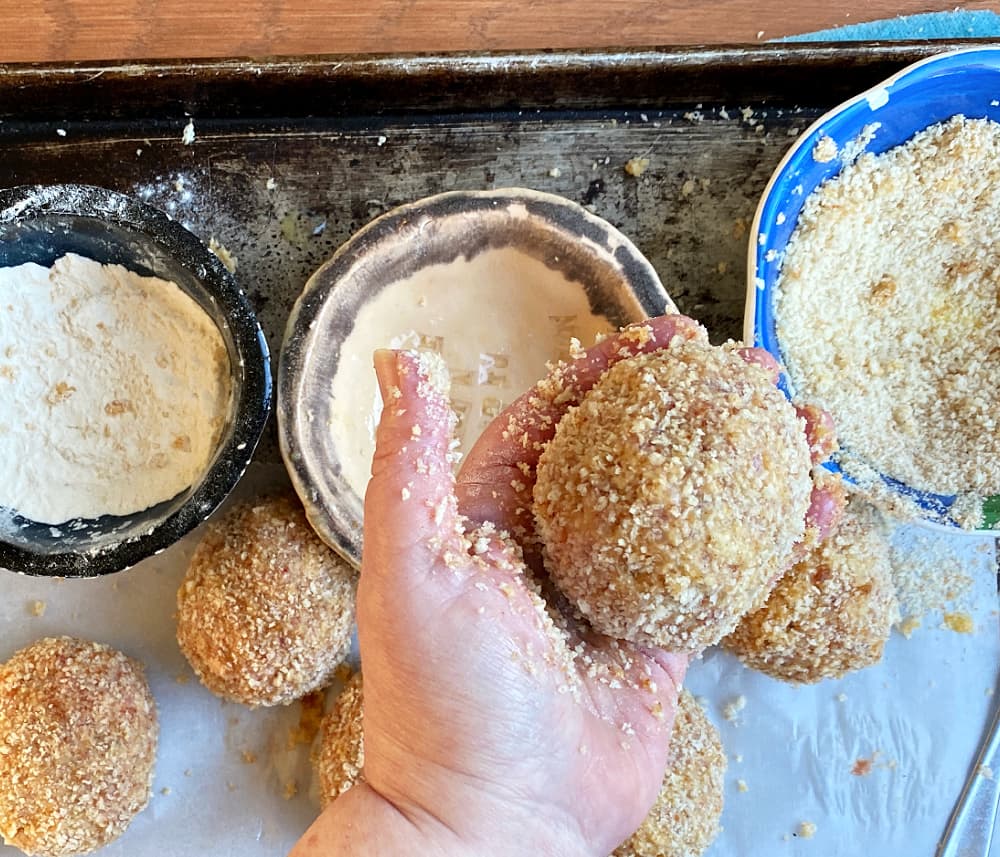
Place breaded eggs on a plate until you have enough done for one batch. (2-6 depending on the size of your air-fryer.).
Air Fry Breaded Eggs
Preheat air fryer at 380°F (193°C) for 5 minutes.
Liberally spray the breaded eggs with non-stick cooking spray or olive oil mist, and set them in the air-fryer basket. Be sure to leave generous space around each one for air to circulate.
Air-fry eggs for 12 minutes, turning halfway through for more even browning.
Hint: See our Top Tip below for how to prep this Scotch eggs recipe in advance.
- No Advance Prep: Eggs are boiled, wrapped, and breaded as outlined in the recipe.
- Partial Advance Prep: Eggs are boiled and refrigerated in their shells, then peeled, wrapped, and breaded immediately before air-frying.
- Full Advance Prep: Eggs are boiled and wrapped in advance, then breaded and air-fried when desired.
Substitutions
- Flour/Wondra: You can use all-purpose flour in place of the Wondra in this recipe, but your results may not be as crispy. (We have not yet tested this recipe using alternative flours.)
Variations
The Scotch egg process lends itself to a myriad of possibilities. For example:
This recipe, however, was developed to take the guesswork out of air fried Scotch eggs, and allows you to make them with centers as soft or firm as you like.
Because the eggs continue to cook while being air-fried, it's easy to overcook the center, particularly when you are trying to make soft-boiled centers. As such, we don't recommend making ingredient changes to this Scotch eggs recipe because each one affects the final outcome.
There is, however, one important variable that you can easily adjust to meet your own tastes: the "egginess" of the center. Results of the eggy centers differ, depending upon how long you boil the eggs.
- Soft Boiled: A 6-minute Scotch egg is perfect for eating on a plate with a knife and fork.
- Hard-boiled: If you plan to pack your Scotch Egg for picnicking and eat it by hand (also perfectly acceptable!) you may want to increase the boiling time to somewhere between seven and nine minutes to avoid unwanted drips. Boil these eggs for up to 10 minutes before wrapping and breading.
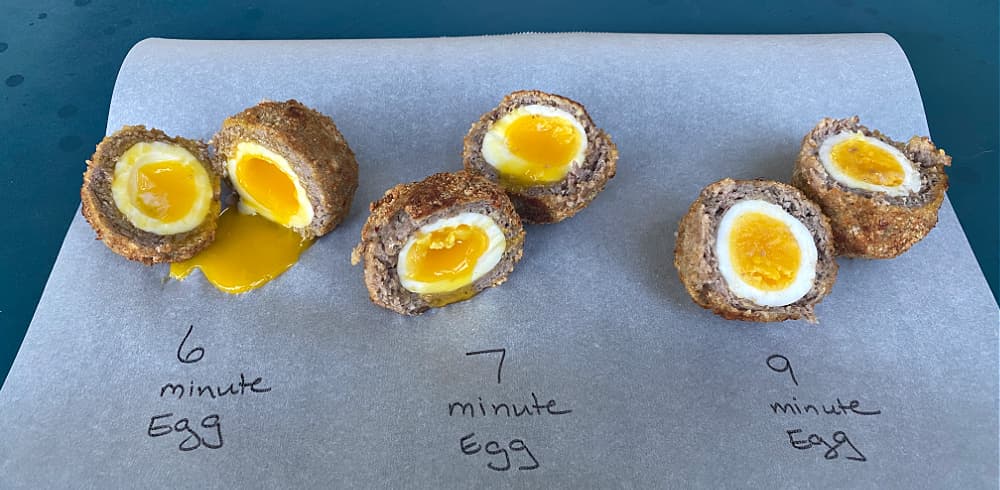
Equipment
Some years ago, my mom gave us a simple, bucket-style air-fryer for Christmas. It has no bells or whistles: it just air-fries. Honestly, we put off using it for the longest time, but once we started, we learned that not only is air-frying is a great alternative to traditional frying, but turns out there are a dozen other uses for it!
We found ourselves using our little air-fryer for so many cooking tasks that we upgraded to a more versatile, large-capacity model with eight different cooking modes. It folds up to save counter space, and we use it almost every day! (The little air-fryer has become a standard part of our travel-kitchen.)
Tip: Looking for more delicious air fryer recipes? Try our Crispy Sauerkraut Fritters! They're amazing!
Storage
Scotch eggs can be stored in air-tight container in the refrigerator for up to 3 days. Do not freeze.
To reheat refrigerated Scotch eggs, set the air fryer temperature to 340°F (172°C) and cook for 4-5 minutes.
How to Prep Scotch Eggs in Advance
Once eggs are boiled and have had their 10-minute ice bath, there are a couple of options, depending on how much advance prep you want to do. (In all cases, allow Scotch Eggs to stand at least 3-5 minutes before serving.)
No Advance Prep (Recipe Default)
- Method: Boil, wrap, and bread eggs immediately before air-frying as outlined in the recipe.
- Cook: Preheat air fryer at 380°F (193°C) for 5 minutes. Cook 12 minutes, turning once halfway through cooking.
Partial Advance Prep
- Method: Boil the eggs and then refrigerate them in their shells, then peel, wrap, and bread them immediately before air-frying. (Soft-boiled eggs should be refrigerated for no more than 3 days.)
- Cook: Preheat air fryer at 380°F (193°C) for 5 minutes. Cook 13 minutes, turning once halfway through cooking.
Full Advance Prep
Note: When Scotch eggs are fully prepped ahead of time and then refrigerated for more than a few hours, the egg white may take on a slightly gray color. This change in appearance has no affect on flavor or texture.
- Method: Boiled and wrapped the eggs in advance, then bread and air-fry when desired. (Sausage-wrapped eggs should be refrigerated for no more than 24 hours in advance.)
- Cook: Preheat air fryer at 380°F (193°C) for 5 minutes. Cook 13 minutes, turning once halfway through cooking.
To refrigerate air fried Scotch eggs, first allow them to cool completely, wrap tightly wrap in plastic film, and store in the fridge for up to 4 days.
These cooking times are all based on using the egg size specified in the recipe, as well as the type and amount of pork sausage. If you change any of these factors, you may need to adjust your cooking times.
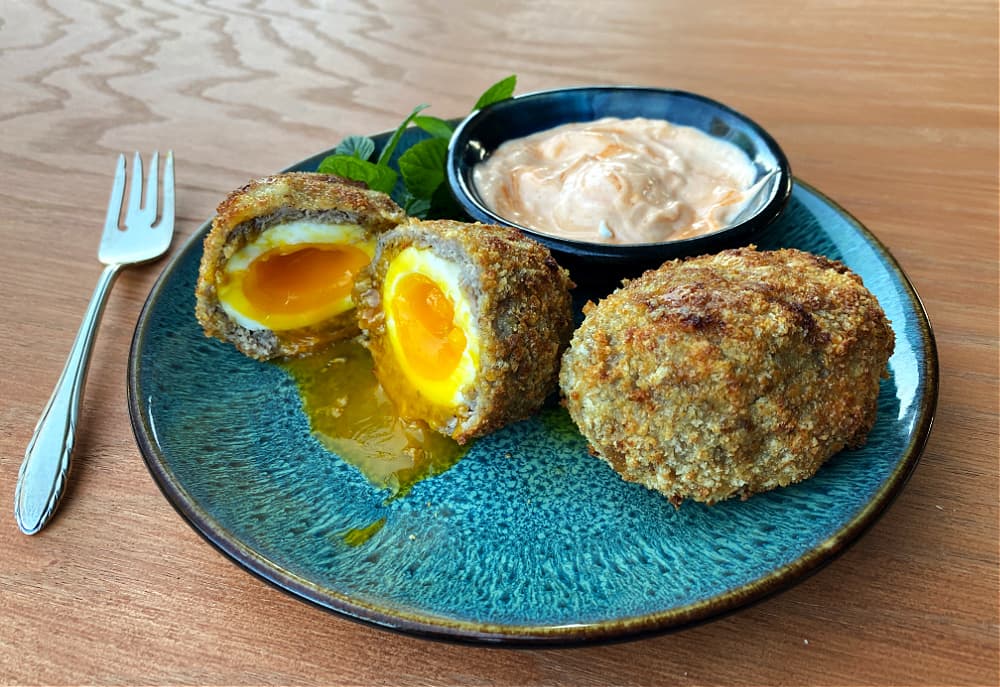
More Egg Recipes
How to Serve Scotch Eggs
Dipping Sauces
Serve Scotch Eggs as is, or with your favorite dipping sauce. Whole Grain Mustard, Sriracha-Mayo, or Honey-Mustard Sauce are all delicious accompaniments.
- Easy Honey Mustard Sauce: Whisk together ½ cup mayo, ¼ cup whole grain mustard, and 2 tablespoons of honey. Refrigerate any leftovers for up to a week.
Breakfast & Brunch
When serving Scotch eggs for breakfast or brunch, potatoes always make a tasty pairing. Smashed potatoes, hash browns, and potatoes pancakes, are all good choices. At the end of the summer, Scotch eggs and fried green tomatoes make an excellent combination. Add a fruit salad on the side for complete meal.
Picnic Pairing
Scotch eggs make a delicious addition to a picnic. They can easily be made ahead of time and eaten hot, warm, or chilled. When preparing for a picnic, boil the eggs for 2-4 minutes longer. (Runny yolks are delicious when warm for breakfast, but we prefer a harder yolk for picnicking.)
Serve them with baked beans, chilled sandwiches, wraps, salads, or anything else you want to pack in your picnic basket.

Want More Free Recipes?
Subscribe to our newsletter to get family-friendly recipes and cozy living ideas in your inbox each week!
Find us on Instagram, Pinterest, and Facebook, too.

Perfect Air Fryer Scotch Eggs (Hard or Soft Boiled)
Equipment
- 3 Small Bowls
Ingredients
- 6 large eggs
- 1 pound Jimmy Dean Regular Pork Sausage
- non-stick cooking spray or olive oil mister
Seasoned Flour (Bowl 1)
- ¼ cup Wondra
- ½ teaspoon garlic powder
Beaten Egg (Bowl 2)
- 1 large egg beaten
Breading Mix (Bowl 3)
- 1 cup Panko crumbs
- 1 tablespoon brown sugar
- ½ teaspoon chili powder
Instructions
Boil a Perfect Soft-boiled Egg
- Fill a medium saucepan halfway with water and bring to a boil over medium-high heat. Remove cold eggs from refrigerator and use a slotted spoon to carefully place them into boiling water. Do not crowd eggs in pan. Reduce heat and cover pan. Simmer for EXACTLY 6 minutes. (For a firmer egg, boil for up to 9 minutes.)
- While eggs are cooking, prepare an ice bath for the eggs in a large bowl. Use the slotted spoon to remove the eggs from the boiling water after the allotted time.Immediately submerge cooked eggs in the prepared ice bath for 10 minutes. The purpose of this step is to halt the cooking process; vital to achieving creamy, runny Scotch Egg centers.
Cover Boiled Eggs with Sausage
- Divide the sausage into 6 equal portions, each weighing 2⅓ ounces (65 grams). Use a kitchen scale for this step if possible. Roll each portion into a ball and place in refrigerator.
- GENTLY peel the prepared boiled eggs. Rinse each egg, and then use a paper towel to carefully pat it dry. Set aside.
- Start with a COLD sausage ball, straight from the fridge. Place meatball in the center of an 8x8 parchment square. Gently pat the meatball down until you have an oval that is about a ¼-inch thick, and roughly 3 eggs long and 2 eggs wide.
- Place the parchment square in your palm. Gently lay a cold, dry, soft-boiled egg on top of the sausage oval, with the ends of the egg perpendicular to the long sides of the oval. Gently pull the sausage away from the parchment as you wrap it around the egg.Continue until the sausage has completely released from the parchment and the egg is covered with sausage. Removed the thick sausage points at each end. Check the egg carefully for areas that might be too thin or too thick, and use the excess removed from the points to seal the edges and even out any thin spots.
- When the sausage appears to be distributed uniformly around the egg, gently pass the egg carefully from one hand to the other a couple of times, allowing the warmth of your palms to smooth the outside surface a bit and the gentle pressure to even out any bumps or rough spots on the surface. If the sausage is too sticky, wet your hands with cold water and then gently dry them. You don't want to use "wet" hands, but slightly damp hands will discourage the sausage from sticking to them.
- Repeat until all the eggs are covered with sausage.
Bread Sausage-covered Eggs
- You will need three small bowls.Bowl 1: Wondra & garlic powder. (Stir to combine.)Bowl 2: Beaten egg.Bowl 3: Panko crumbs, brown sugar, and chili powder.
- Roll each sausage-covered egg in flour mixture (Bowl 1) and shake off excess, then dip in the beaten egg (Bowl 2), and finally roll in the Panko crumbs (Bowl 3).When I finish rolling the eggs in the last bowl, I like to pass it carefully from one hand to the other a couple of times, to help form and structure the outside crust a bit; much like you would form a meatball, but exerting far less external pressure. Place breaded eggs on a plate until you have enough done for one batch. (2-6 depending on the size of your air-fryer.).
Air Fry Breaded Eggs
- Preheat air fryer at 380°(195°C) for 10 minutes. Liberally spray the breaded eggs with non-stick cooking spray or olive oil mist, and set them in the air-fryer basket. Be sure to leave generous space around each one for air to circulate.
- Air-fry eggs for 12 minutes, turning halfway through for more even browning. See NOTES for Advance Prep.
- Serve alone, or with your favorite dipping sauce (i.e., Whole Grain Mustard, Sriracha-Mayo, Ranch, or Honey-Mustard Sauce, etc.).
Video
Notes
How to Prep Scotch Eggs in Advance
Partial Advance Prep
- Method: Boil the eggs and then refrigerate them in their shells, then peel, wrap, and bread them immediately before air-frying. (Boiled eggs should be refrigerated for no more than 3 days.)
- Time: Preheat air fryer at 380°F (193°C) for 5 minutes. Cook 13 minutes, turning once halfway through cooking.
Full Advance Prep
Note: When Scotch eggs are fully prepped ahead of time and then refrigerated for more than a few hours, the egg white may take on a slightly gray color. This change in appearance has no affect on flavor or texture.- Method: Boiled and wrapped the eggs in advance, then bread and air-fry when desired. (Sausage-wrapped eggs should be refrigerated for no more than 24 hours in advance.)
- Time: Preheat air fryer at 380°F (193°C) for 5 minutes. Cook 13 minutes, turning once halfway through cooking.
Nutrition
This website provides approximate nutrition information for convenience and as a courtesy only. You are solely responsible for ensuring that any nutritional information provided is accurate, complete, and useful.
Thank you for visiting the Good Hearted Woman. Remember to bookmark this site, and come back soon!



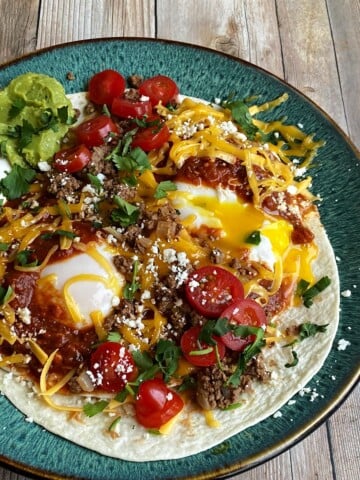
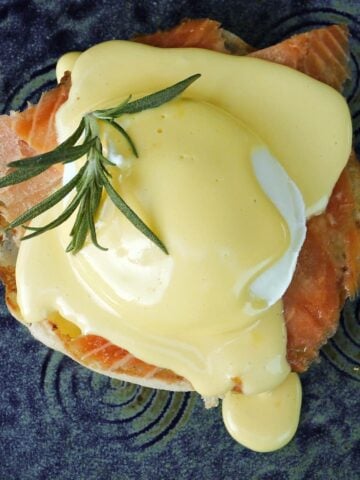
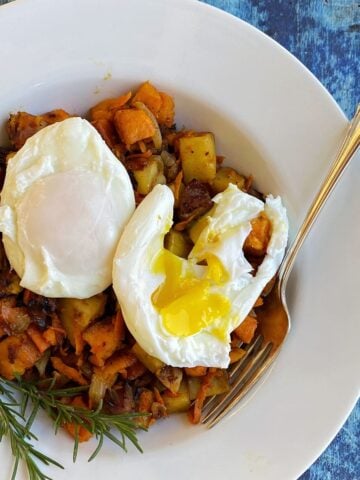
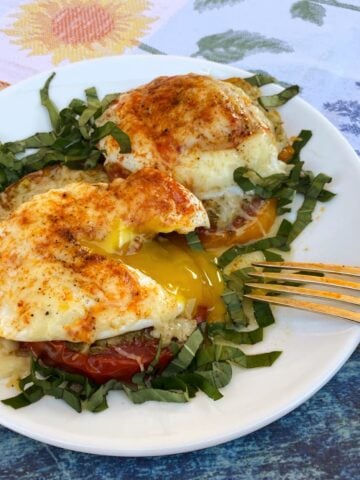
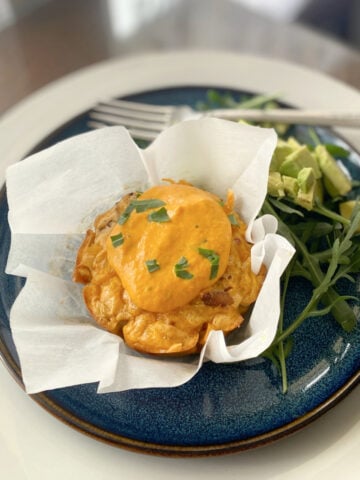
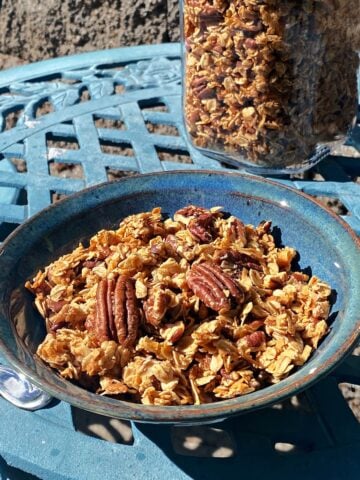
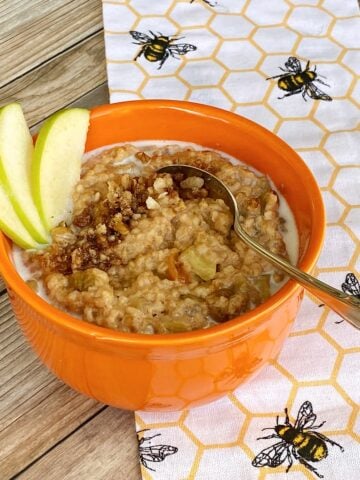
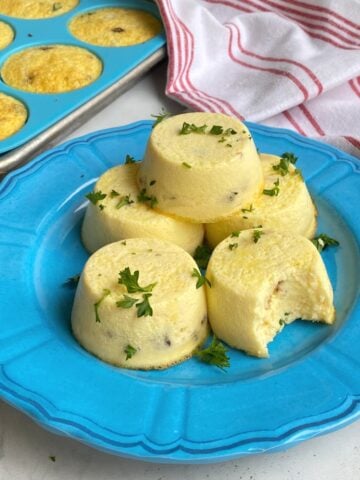
Cassie says
First time making scotch eggs, loved the flavor! However my issue is the coating falling off when I cut them. Am I doing something wrong? I followed the instructions. American with a scottish boyfriend, so this is new for me, but love them!
Renée B. says
It sounds like you did a great job with the flavor! If the coating is falling off, try chilling this eggs before wrapping them. This helps the sausage cling better to the egg. Also, ensure the sausage layer is even and pressed firmly around the egg, without any gaps. I hope these tips help on your next attempt—your boyfriend is lucky to have someone making this classic Scottish snack!
Andy says
Thank you for sharing this.
Rather than boiling the eggs, I air fried them - preheated - at 125C, 250F for 12 minutes, then put them in cold water for 5 minutes to stop them cooking further. Using plain sausage meat I added smoked paprika, Italian herb seasoning and garlic granules, covered the peeled eggs as per your recipe. Cooking at 170C, 325F for 15 minutes they were lovely, warm less than an hour out of the air Fryer and chilledfor lunch the following day.
Renée B. says
Thanks for the great tips! I need to directions for air-frying the "soft-boiled" eggs to this recipe.
Sveta says
Thanks a lot for sharing this banging recipe. Was my first attempt on scotch egg, did work out!!!!
All notes are very useful and appreciated, thanks again, take care 🙂
Sveta
Renée B. says
Thanks so much for the kind words - so glad to help!
nick says
Well done!! Thank you for sharing.
Becky Moore says
I’ve made Scotch Eggs for a few years now, baking them in the oven. Although they have always tasted great, they’ve always cracked and leaked. These turned out perfectly. I love your instructions. Worked perfectly. BTW, I do my eggs in an instant pot. Always creamy and perfect. I did six minutes in the instant pot and they were barely hard. For softer eggs like yours I’d suggest four to five minutes in the instant pot. The best part is the shell slips right off.
I’ll update the review when we eat these, however, I’m sure they will be delicious. I made them for tailgating this weekend.
PS…I took a picture but don’t know if I can post it here.
Renée says
Scotch Eggs are definitely tricky: I don't even want to think about how many eggs we went through perfecting the cooking times for this recipe! Thanks so much for the Instant Pot tips - I know a lot of people swear by IP eggs and will really appreciate reading about your experience.
nicholas__t says
So very good. As you pointed out, Wrapping the sausage around soft boiled eggs is a bit tricky.
Mmmm.
Cassandra H says
Wow, you had instructions for all options. I plan on boiling my eggs the night before and was wondering how I’d have to change the recipe but you already figured that one out! I’ll be making for Easter morning. Hope it turns out great!
Tara says
Such amazing eggs! They look absolutely incredible with that sausage coating and the texture from the air fryer. Love all the tips too!
Renée says
I'm thrilled with how they turn out in the air-fryer, and it makes them a 10-times easier to make. (Or rather, it makes the "clean-up" a 10-times easier.)
Aimee says
Okay, I confess I've never had Scotch eggs, but this is the second time I've seen them recently and you make them look and sound so delicious. I know I've got to try them now! What a fun brunch idea.
Renée says
Making them in the air-fryer makes all the difference to me: it makes them so much easier and more "accessible."
veenaazmanov says
This is such a lovely party recipe. Simple yet so delicious and unique. Would love to check it out on a weekend.
Cathleen says
I have always wanted to try making scotch eggs, so this is perfect for me!! Making it this weekend. Thank you so much for the recipe 🙂
Renée says
Making them in the air-fryer is a game-changer! Enjoy!
Mitchell says
Worked brilliantly. The tips on wrapping etc are spot on. I am British and therefore a scotch egg connoisseur (😉) and this recipe is the most user friendly I've come across so far. I put the boiled eggs in the freezer for ten minutes before removing the shell as it firms the soft eggs up.
I prefer the air fryer method the colourist quite as good as deep frying but it's just as crispy and far less greasy.
Thanks for sharing this great recipe.
Renée says
What a wonderful way to wake up - to a comment like yours! I'm so glad everything worked well for you, and I sincerely appreciate your connoisseur's endorsement, too! Thank you fo advice about putting the boiled eggs in the freezer for 10 minutes: we will definitely give it a try next time we make them.
Jessie says
Yum! I am thinking that I will be making these for brunch tomorrow.